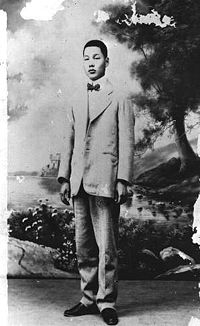
Lai He
Encyclopedia

Poet
A poet is a person who writes poetry. A poet's work can be literal, meaning that his work is derived from a specific event, or metaphorical, meaning that his work can take on many meanings and forms. Poets have existed since antiquity, in nearly all languages, and have produced works that vary...
who was born in Changhua, Taiwan
Taiwan
Taiwan , also known, especially in the past, as Formosa , is the largest island of the same-named island group of East Asia in the western Pacific Ocean and located off the southeastern coast of mainland China. The island forms over 99% of the current territory of the Republic of China following...
. He was a medical doctor
Physician
A physician is a health care provider who practices the profession of medicine, which is concerned with promoting, maintaining or restoring human health through the study, diagnosis, and treatment of disease, injury and other physical and mental impairments...
but had enormous fame in literature. His poetry
Poetry
Poetry is a form of literary art in which language is used for its aesthetic and evocative qualities in addition to, or in lieu of, its apparent meaning...
works were especially praised, and Lai was commonly known as one of Taiwan's most representative poets.
Early life
Lai's work can broadly be divided into three phases. During his early career, he wrote primarily classical Chinese poetry. On a sojourn as a doctor in a Japanese hospital in Amoy (now called Xiamen), a treaty port in China, he became acquainted with the work of Chinese May Fourth writers such as Lu Hsun (Lu Xun). Although his stay in China seems to have been depressing, he returned to Taiwan with the intention to contribute to Taiwan's cultural scene. He opened a reading room in his clinic where he provided Chinese vernacular ficition as well as Japanese periodicals. This reading room allowed him to mentor several important writers of the late Japanese colonial period. Most of his writing during this second period was nativist in his choice of themes and satirical in form. Through several short stories written during the 1920s and early 1930s, Lai satirized the brutality of colonial policemen, the indifference of the populace, and the impotence of native intellectuals. During the third period, Lai became more nativist in orientation and actively experimented with writing in Taiwanese. Although these experiments were not entirely successful, they expressed an emerging Taiwanese national consciousness upon which later Taiwanese writers would build.Political activity and legacy
In addition to his writing, Lai participated in the Taiwan Cultural Association and other activist groups. His political activity led to his arrest and a subsequent illness contracted in jail, which caused his early demise. Japanese wartime strictures on writing in languages other than the national language forced him to stop his literary output slightly before his death. He was an influence on his younger contemporaries Yang Kuei and Wu Chuo-liu. His rediscovery during the late 1970s and early 1980s also contributed to Taiwan's new nativist literature.Literature works
- "The Advocate." Tr. Rosemary Haddon. B.C. Asian Review 1 (1987). Rpt. in Rosemary Haddon, tr./ed , Oxcart: Nativist Stories from Taiwan, 1934-1977. Dortmund: Projekt Verlag, 1996, 59-72.
- "A Diary in Jail." Tr. Tr. Llyod and Shu-ning Sciban. Taiwan Literature, English Translation Series 15 (2004): 155-64.
- "A Dissatisfying New Year." Tr. John Balcom. Taiwan Literature, English Translation Series 15 (2004): 41-48.
- "The Homecoming." Tr. Yingtsih Hwang. Taiwan Literature, English Translation Series 15 (2004): 49-54.
- "Making Trouble." Tr. John Balcolm. Taiwan Literature, English Translation Series 15 (2004): 25-40.
- Poems in: Taiwan Literature, English Translation Series 15 (2004): 165-76.
- "Progress." Tr. Llyod and Shu-ning Sciban. Taiwan Literature, English Translation Series 15 (2004): 149-54.
- "Returning from a Spring Banquet." Yingtsih Hwang. Taiwan Literature, English Translation Series 15 (2004): 55-58.
- "The Steelyard." Tr. Jane Parish Yang. In Joseph Lau, ed. The Unbroken Chain: An Anthology of Fiction from Taiwan. Bloomington: Indian UP, 1983, 3-11. Also Tr. by Howard Goldblatt. Taiwan Literature, English Translation Series 15 (2004): 15-24.

